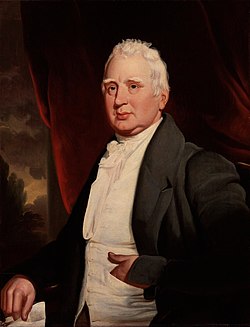Theory of politics and economics of Anglo-French writer Hilaire Belloc (1870-1953).
Since property is desirable, it should be distributed to all households, each of which should have enough on which to make a living.
Distributism had more application to agricultural society, and was ill-adapted to an industrial one.
Source:
Rodney Barker, Political Ideas in Modern Britain (London, 1978)
Overview
According to distributists, the right to property is a fundamental right[6] and the means of production should be spread as widely as possible rather than being centralized under the control of the state (state capitalism), a few individuals (plutocracy), or corporations (corporatocracy). Therefore, distributism advocates a society marked by widespread property ownership.[1] Cooperative economist Race Mathews argues that such a system is key to bringing about a just social order.[7]
Distributism has often been described in opposition to both laissez-faire capitalism and state socialism[8][9] which distributists see as equally flawed and exploitative.[10] Furthermore, some distributists argue that state capitalism and state socialism are the logical conclusion of capitalism as capitalism’s concentrated powers eventually capture the state.[11][12] Thomas Storck argues: “Both socialism and capitalism are products of the European Enlightenment and are thus modernizing and anti-traditional forces. In contrast, distributism seeks to subordinate economic activity to human life as a whole, to our spiritual life, our intellectual life, our family life.”[13] A few distributists[14] were influenced by the economic ideas of Pierre-Joseph Proudhon and his mutualist economic theory,[15] and therefore the lesser-known anarchist branch of distributism of Dorothy Day and the Catholic Worker Movement could be considered a form of free-market libertarian socialism due to their opposition to both state capitalism and state socialism.[16]
Some have seen it more as an aspiration, which has been successfully realised in the short term by commitment to the principles of subsidiarity and solidarity (these being built into financially independent local cooperatives and small family businesses), although proponents also cite such periods as the Middle Ages as examples of the historical long-term viability of distributism.[17] Particularly influential in the development of distributist theory were Catholic authors G. K. Chesterton and Hilaire Belloc,[10] the Chesterbelloc, two of distributism’s earliest and strongest proponents.[18][19]
In the early 21st century, several observers[20][21][22][23] speculated on Pope Francis’s position on distributism after he denounced unfettered capitalism in his apostolic exhortation Evangelii gaudium,[24][25][26] in which he stated: “Just as the commandment ‘Thou shalt not kill’ sets a clear limit in order to safeguard the value of human life, today we also have to say ‘thou shalt not’ to an economy of exclusion and inequality. Such an economy kills. […] A new tyranny is thus born, invisible and often virtual, which unilaterally and relentlessly imposes its own laws and rules. To all this we can add widespread corruption and self-serving tax evasion, which has taken on worldwide dimensions. The thirst for power and possessions knows no limits.”[27]
Background
The mid-to-late 19th century witnessed an increase in popularity of political Catholicism across Europe.[28] According to historian Michael A. Riff, a common feature of these movements was opposition not only to secularism, but also to both capitalism and socialism.[19] In 1891 Pope Leo XIII promulgated Rerum novarum, in which he addressed the “misery and wretchedness pressing so unjustly on the majority of the working class” and spoke of how “a small number of very rich men” had been able to “lay upon the teeming masses of the laboring poor a yoke little better than that of slavery itself”.[29] Affirmed in the encyclical was the right of all men to own property,[30] the necessity of a system that allowed “as many as possible of the people to become owners”,[31] the duty of employers to provide safe working conditions[32] and sufficient wages,[33] and the right of workers to unionise.[34] Common and government property ownership was expressly dismissed as a means of helping the poor.[35][36]
Around the start of the 20th century, G. K. Chesterton and Hilaire Belloc drew together the disparate experiences of the various cooperatives and friendly societies in Northern England, Ireland, and Northern Europe into a coherent political theory which specifically advocated widespread private ownership of housing and control of industry through owner-operated small businesses and worker-controlled cooperatives. In the United States in the 1930s, distributism was treated in numerous essays by Chesterton, Belloc and others in The American Review, published and edited by Seward Collins. Pivotal among Belloc’s and Chesterton’s other works regarding distributism are The Servile State,[37] and Outline of Sanity.[38]
Although a majority of distributism’s later supporters were not Catholics and many were in fact former radical socialists who had become disillusioned with socialism, distributist thought was adopted by the Catholic Worker Movement, conjoining it with the thought of Dorothy Day and Peter Maurin concerning localized and independent communities. It also influenced the thought behind the Antigonish Movement, which implemented cooperatives and other measures to aid the poor in the Canadian Maritimes. Its practical implementation in the form of local cooperatives has been documented by Race Mathews in his 1999 book Jobs of Our Own: Building a Stakeholder Society.
Political spectrum

Distributism’s relation to socialism and capitalism

William Cobbett’s social views influenced G. K. Chesterton
The position of distributists when compared to other political philosophies is somewhat paradoxical and complicated (see triangulation). Strongly entrenched in an organic but very English Catholicism, advocating culturally traditionalist and agrarian values, directly challenging the precepts of Whig history—Belloc was nonetheless an MP for the Liberal Party and Chesterton once stated “As much as I ever did, more than I ever did, I believe in Liberalism. But there was a rosy time of innocence when I believed in Liberals”.[39] This liberalism is different from most modern forms, taking influence from William Cobbett and John Ruskin, who combined elements of radicalism, challenging the establishment position, but from a perspective of renovation, not revolution; seeing themselves as trying to restore the traditional liberties of England and her people which had been taken away from them, amongst other things, since the Industrial Revolution.
While converging with certain elements of traditional Toryism, especially an appreciation of the Middle Ages and organic society, there were several points of significant contention. While many Tories were strongly opposed to reform, the distributists in certain cases saw this not as conserving a legitimate traditional concept of England, but in many cases entrenching harmful errors and innovations. Belloc was quite explicit in his opposition to Protestantism as a concept and schism from the Catholic Church in general, considering the division of Christendom in the 16th century one of the most harmful events in European history. Elements of Toryism on the other hand were quite intransigent when it came to the Church of England as the established church, some even spurning their original legitimist ultra-royalist principles in regards to James II to uphold it.
Much of Dorothy L. Sayers’ writings on social and economic matters has affinity with distributism. She may have been influenced by them, or have come to similar conclusions on her own. As an Anglican, the reasonings she gave are rooted in the theologies of Creation and Incarnation, and are slightly different[how?] from the Catholic Chesterton and Belloc.
Economic theory
Private property

Self-portrait of Chesterton based on the distributist slogan “Three acres and a cow”
Under such a system, most people would be able to earn a living without having to rely on the use of the property of others to do so. Examples of people earning a living in this way would be farmers who own their own land and related machinery, carpenters and plumbers who own their own tools, among others. The cooperative approach advances beyond this perspective to recognise that such property and equipment may be co-owned by local communities larger than a family, e.g. partners in a business.
In Rerum novarum, Leo XIII states that people are likely to work harder and with greater commitment if they themselves possess the land on which they labour, which in turn will benefit them and their families as workers will be able to provide for themselves and their household. He puts forward the idea that when men have the opportunity to possess property and work on it, they will “learn to love the very soil which yields in response to the labor of their hands, not only food to eat, but an abundance of the good things for themselves and those that are dear to them”.[40] He states also that owning property is not only beneficial for a person and their family, but is in fact a right, due to God having “given the earth for the use and enjoyment of the whole human race”.[41]
Similar views are presented by G. K. Chesterton in his 1910 book What’s Wrong with the World. Chesterton believes that whilst God has limitless capabilities, man has limited abilities in terms of creation. As such, man therefore is entitled to own property and to treat it as he sees fit, stating: “Property is merely the art of the democracy. It means that every man should have something that he can shape in his own image, as he is shaped in the image of heaven. But because he is not God, but only a graven image of God, his self-expression must deal with limits; properly with limits that are strict and even small.”[42] Chesterton summed up his distributist views in the phrase “Three acres and a cow”.
According to Belloc, the distributive state (the state which has implemented distributism) contains “an agglomeration of families of varying wealth, but by far the greater number of owners of the means of production”. This broader distribution does not extend to all property, but only to productive property; that is, that property which produces wealth, namely, the things needed for man to survive. It includes land, tools, and so on.[43] Distributism allows for society to have public goods such as parks and transit systems. Distributists accept that wage labor will remain a small part of the economy, with small business owners hiring employees, usually young, inexperienced people.

it is a recommend statement
Thanks , I’ve recently been looking for information about this topic for a while and yours is the greatest I’ve found out so far. However, what in regards to the bottom line? Are you positive concerning the supply?
I like what you guys are up also. Such smart work and reporting! Keep up the superb works guys I have incorporated you guys to my blogroll. I think it’ll improve the value of my site 🙂
I was reading some of your articles on this site and I think this web site is very instructive! Keep posting.